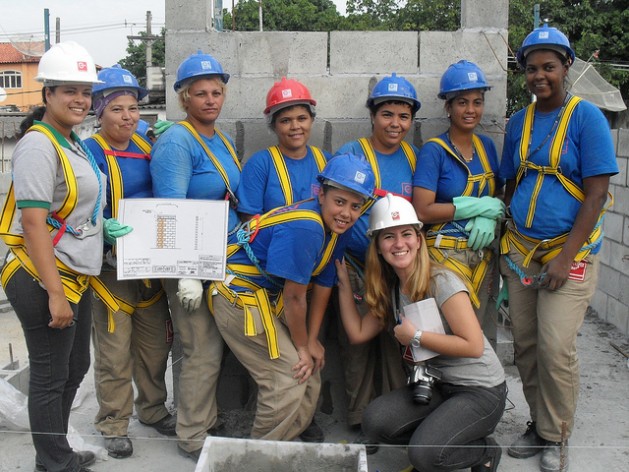Norms and Prejudices are Still Holding Women Back

NAIROBI, Mar 13 (IPS) - Two profound incidents happened the week of International Women's Day.
One, Senator Elizabeth Warren, the Democratic Party candidate for President of the U.S., bowed out of the election race despite what commentators said was a strong campaign with a "plan for everything" and strong message of economic populism. Now there are no female frontrunners left.
Two, the United Nations Development Programme released a report headlined "Almost 90% of men/women globally are biased against women". The report argues that in different spheres - employment, education, politics - when empowerment is basic and precarious, women are overrepresented, but as power increases the gender gap widens.
Three critical statistics stand out from the report - 50 percent of people say they think men make better political leaders, more than 40 percent feel that men make better business executives than women, and 30 percent believe it is okay for men to beat their spouses.
At the centre of this are harmful social norms, beliefs and stereotypes. For example, while legal barriers on women's ability to vote and be elected have been removed in most countries, and women can participate in the economy without formal restrictions perceptions, beliefs about women's capabilities and prejudices create an often-invisible barrier to women.
These discriminatory social norms and stereotypes reinforce gendered identities and determine power relations which in turn constrain what men and women can do in ways that lead to inequality and exclusion
And while policies such as affirmative action or equal parental leave can provide guidelines and basic principles to address inequalities, they are not sufficient to address those inequalities that are rooted in social exclusion and longstanding social norms.
We must challenge harmful gender norms, belief systems and stereotypes.
First, we can provide individuals with the information and knowledge that can cultivate different values, behaviours and belief systems. Gender norms are transferred and reinforced through communication, much of which happens informally within families and among peer groups in the wider community or through schools, religious organisations, government policies, and the media.
It follows that, communication and knowledge that provides alternative narratives can change belief systems and stereotypes.
In a recent review by the Overseas Development Institute, 71 percent of the wide range of communications programmes were effective in changing norms, attitudes and practices.
In one of the programs in Taru, India, – a radio soap opera that featured a young woman health worker – led to more supportive attitudes among listeners towards girls' rights to education and to reduced support for sex-selective abortion.
In Zambia, a community theatre in fishing communities that showed women making decisions and owning assets led to 30 percent more women increasing their contributions to decision-making regarding fish processing and 49 percent more taking part in deciding what to do with the associated income.
Second is addressing the household power dynamics and changing unequal power relationships within households by engaging men and boys.
Even in areas such as food and nutrition, assumptions, norms and practices about women needing fewer calories, or not being allowed to eat certain food—can push women and girls into perpetual malnutrition and protein deficiency.
For example in Ghana, father-to-father support groups, comprised of men who to discuss family-oriented issues that include infant and young child feeding, household interaction and support, and male involvement in child welfare have lead to men adopting new behaviors that contribute to the health and wellbeing of their households, especially pregnant and lactating women and children. Working with groups of men, as gender champions eliminates stigma foe men who are seen to be doing ‘women's tasks'.
Third is removing sanctions for non-compliance to harmful norms and providing incentives for alternative more equitable norms through engaging traditional or religious leaders, duty bearers and norm ‘enforcers'.
Research shows that a social norm will be stickiest when individuals have the most to gain from complying with it and the most to lose from challenging it. Leaders have a lot of influence on the culture of a group or as they have the most control of sanctioning and can also set a strong expectation from others.
When female senior chief Theresa Kachindamoto in Malawi annulled 850 child marriages in 2016, she set expectations for all village heads firing from their jobs those that refused to ban the practice of child marriage.
And finally, for long term change, socialising boys and girls to more equitable sharing of roles and responsibilities, equal opportunities and respect for all irrespective of gender.
Society expects different attitudes and behaviors from boys and girls leading to boys and girls being socialized differently and to have different opportunities.
For example a report by UNICEF shows that girls between 5 and 14 years old spend 40 per cent more time, or 160 million more hours a day, on unpaid household chores and collecting water and firewood compared to boys their age.
But socialization also goes beyond roles to expectations and personality traits for example messaging of "boys are aggressive", "girls are good at reading" "men are scientists".
Parents' gender-role modeling is critical in changing children's perceptions and belief systems. Research for example has shown that a fathers' childcare involvement is negatively related to children's gender stereotyping.
And as Senator Elizabeth Warren said as she bowed out, we can not make these "pinky promises" that girls can be anything they want including president, without addressing the norms and prejudices that hold them back.
© Inter Press Service (2020) — All Rights Reserved. Original source: Inter Press Service

